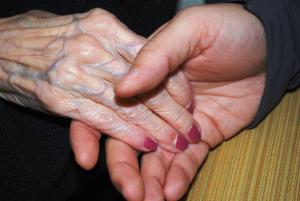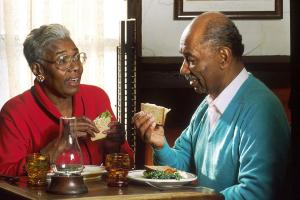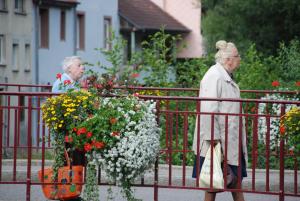by Amber Kevlin, RN | Mar 19, 2024 | Senior Home Care
Senior arthritis pain is an extremely widespread problem causing pain and stiffness in their joints. Knowing the concerns and realities about elderly arthritis pain is imperative in order to offer the right support and care for the seniors that suffer from this condition.
Firstly, there is the need to identify the risk factors for the development of arthritis in older adults. Age is a major factor since the probability of getting arthritis increases with age.
Arthritis risk factors include:
- Previous joint injuries

- Obesity
- Genetics
- Careers that include repetitive joint movements, especially computer-heavy careers
Knowing about arthritis can assist caregivers and healthcare providers provide the right help. Arthritis is not a single disease, on the contrary, it is an umbrella term for more than 100 different joint diseases.
The most common ones are osteoarthritis and rheumatoid arthritis.
When it comes to helping seniors manage arthritis, there are several strategies that can be beneficial:
- Performing regular senior arthritis exercises promotes joint flexibility and decreases pain
- A recommendation is less vigorous activities like swimming or walking
- Controlling your weight, as obesity can cause undue stress on joints. Healthy senior arthritis foods can help reduce weight.
The other forms of relief for elderly with arthritis are supplying assistive devices like braces or splints to support joints, assuring good nutrition to maintain joint health and also minimizing joint strain by making the environment safe and ergonomic.
Through knowledge of risks associated with senior arthritis, facts about types of arthritis, and implementation of strategies to help the seniors live with their current condition, caregivers can play a vital part in improving their quality of life.
Looking for help at home?
My Choice Home Care is a senior care service that serves clients in Macon, Jackson, and Haywood Counties in North Carolina. Counties served in Georgia are Rabun, Towns, and Habersham. Counties served in Upstate South Carolina are Oconee, Pickens, and Anderson.
How to reach us
Click here to send us a message or call (828) 200-9000 to speak to someone today if you or a loved one would like to enjoy the benefits of living independently in your own home.
by Amber Kevlin, RN | Mar 12, 2024 | Senior Home Care
Food safety can often be a concern for seniors, or others that may have a bit of a forgetful nature. Below are some tips to help keep food fresh, and bacteria out!
First off, you want to make sure that your refrigerator is running at the right temperature. Perishable foods need to be kept refrigerated at 40 degrees or below. Otherwise bacteria may start to grow, and bacteria grows very rapidly. Invest in a good appliance thermometer (they’re about $7-$10) to make sure you’re within the safe range.
Food will mostly stay good for up to four days in your refrigerator.
Beyond that point you are running the risk of it spoiling. Fruits, veggies, and deli meat spoil fastest, with fish close behind. Chicken and pork will spoil next, with beef kept just a bit longer.
Every time you reheat your food, the quality declines, so try to only scoop out what you plan on eating each time instead of reheating the entire dish.
There are a few rules to refrigeration safety to follow. These simple guidelines will help your tasty meals keep good in the fridge for quick bites later on in the week.
Do these things to ensure food safety for older adults
- Refrigerate all perishable food items as soon as you can

- Always marinate your foods in the refrigerator instead of on the countertop
- Chicken, eggs, raw meat, cut fruits and vegetables or cooked food should be frozen or refrigerated before sitting out for a maximum of two hours. One hour is the max when the indoor temperature is above 90°F
- Never let your frozen foods defrost at room temperature! To safely thaw food, place it in the fridge to defrost. You can pour cold water over the food in the sink to quickly defrost it.
- Cook all thawed foods immediately
- Go through your fridge every few days and either use or discard leftovers
A good rule of thumb is to keep your refrigerator clean to avoid cross-contamination.
Any time you are storing raw meat of any kind, wiping down the shelf it was on or the drawer it was in with an antibacterial wipe. This will reduce your risk of picking up something nasty, such as salmonella, listeria, E. coli, whipworms or trichinosis.
It’s estimated that each year, 48 million people in the United States suffer from some kind of acute foodborne illness, and 3,000 will die from them. Unsafe food may harbor parasites, chemicals, and many different types of bacteria that can be harmful to you and your family.
If you really can’t tell, just remember, when in doubt, throw it out!
Looking for help at home to protect your senior loved ones from foodborne illnesses? My Choice Home Care is an elderly in-home care service that serves clients in Macon, Jackson, and Haywood Counties in North Carolina. Counties served in Georgia are Rabun, Towns, and Habersham. Counties served in Upstate South Carolina are Oconee, Pickens, and Anderson. You can send us a message here or call (828) 200-9000 to speak to someone today. We can help your loved ones enjoy the benefits of living independently.
by Amber Kevlin, RN | Mar 4, 2024 | Senior Home Care
 A comprehensive approach is required for managing senior diabetes. This starts with understanding the causes of diabetes. Then a practice of promoting healthy food choices, daily movement, monitoring normal blood sugar levels and focusing on prevention strategies.
A comprehensive approach is required for managing senior diabetes. This starts with understanding the causes of diabetes. Then a practice of promoting healthy food choices, daily movement, monitoring normal blood sugar levels and focusing on prevention strategies.
Diabetes in seniors can be caused by a combination of factors such as genetics, lifestyle choices, and age-related changes. It is crucial to educate seniors about the importance of maintaining a balanced diet rich in nutrients and low in sugar to help manage their condition effectively.
A good senior diabetic meal plan that includes drinking enough water and consuming healthy foods is a pillar of health. Foods such as fruits, vegetables, whole grains, lean proteins, and low-fat dairy products can play a significant role in controlling blood sugar levels and preventing complications associated with diabetes.
Some of these senior diabetic diet foods include:
- Fruits and vegetables
- Beans and lentils
- Whole-grain cereals, breads, and crackers
- Whole grains such as oats, barley, bulgur, and buckwheat
- Dried fruit and nuts
- Poultry such as chicken and turkey
- Skinless fish
- Leaner cuts of beef
- Tofu
- Eggs
- Low-fat dairy, such as cheese and Greek yogurt
- Nuts and nut butter
How to prevent diabetes in older adults
Preventing diabetes in seniors involves promoting regular physical activity, weight management, monitoring the blood glucose level regularly, and seeking medical advice for proper diagnosis and treatment. By implementing these strategies proactively, seniors can lead healthier lives while managing their diabetes effectively.
We can help you and your loved ones.
Looking for help with elderly diabetes management at home? My Choice Home Care is an in-home elderly care service that serves clients in Macon, Jackson, and Haywood Counties in North Carolina. Counties served in Georgia are Rabun, Towns, and Habersham. Counties served in Upstate South Carolina are Oconee, Pickens, and Anderson.
You can contact us here or call (828) 200-9000 to speak to someone today if you or a loved one would like to enjoy the benefits of living independently in your own home. We offer a senior care guide here to help you manage your loved one’s care.
by Amber Kevlin, RN | Feb 20, 2024 | Senior Home Care
Dehydration for elderly seniors is a very common and very serious health concern. As we mature, our bodies become less efficient at regulating fluid balance. This can make older adults more susceptible to dehydration.
Understanding the risks, complications, and prevention strategies associated with dehydration in seniors is crucial for maintaining their overall health and well-being.
Some common elderly dehydration causes:
- Medications commonly prescribed to seniors can have diuretic effects, increasing urine production and the risk of fluid and electrolyte loss.
- Age-related changes in thirst perception can lead to decreased fluid intake causing senior dehydration.
- Chronic conditions such as diabetes or kidney disease can also contribute.
Prevention is key when it comes to combating dehydration.
 Encouraging regular fluid intake throughout the day is important. Offering fluids that are appealing and easily accessible can help increase consumption, and may help replenish lost electrolytes, such as zero-sugar Gatorade or Pedialyte.
Encouraging regular fluid intake throughout the day is important. Offering fluids that are appealing and easily accessible can help increase consumption, and may help replenish lost electrolytes, such as zero-sugar Gatorade or Pedialyte.
Monitoring medication side effects and adjusting dosages if necessary is also important to prevent dehydration senior citizens could experience.
If you notice that a loved one has dramatically decreased their fluid intake, make sure to speak to a doctor right away. Complications arising from senior dehydration can be severe.
Elderly dehydration signs
Dehydration for elderly seniors can lead to electrolyte imbalances, urinary tract infections, kidney stones, and even heatstroke in extreme cases. Cognitive function may also be affected, leading to confusion or delirium. Cognitive decline may also be a root cause of senior dehydration. Here are some more signs and symptoms to look for.
Tracking patterns of change in a senior’s diet is essential in catching potentially harmful health issues before they can make an impact.
Looking for help at home to keep your senior loved ones healthy and hydrated? My Choice Home Care is an in-home elderly care service. One of our priorities is teaching how to prevent senior dehydration. We serve clients in Macon, Jackson, and Haywood Counties in North Carolina. Counties served in Georgia are Rabun, Towns, and Habersham. Counties served in Upstate South Carolina are Oconee, Pickens, and Anderson. Visit MyChoiceHome.Care or call (828) 200-9000 to speak to someone today if you or a loved one would like to enjoy the benefits of living independently in your own home.
by Amber Kevlin, RN | Feb 8, 2024 | Senior Home Care
 Winter can be an intimidating time of year for seniors, especially those that live alone in areas where severe cold and bad weather possibilities are common.
Winter can be an intimidating time of year for seniors, especially those that live alone in areas where severe cold and bad weather possibilities are common.
Here in the mountains of North Carolina, it’s a tough job for meteorologists to accurately predict some sneaky winter storms.
Staying two steps ahead of the weather can be helpful in planning for seniors and winter care. This can prevent serious emergencies for seniors living independently in the home.
We summarized some useful winter safety tips for seniors:
- Make sure to have a network of support. Make a list of neighbors you can call if you need help. Notify nearby friends and family for a solid elderly care winter assistance plan.
- Charged battery packs for your cell phone and electronics in case you DO need to call for help. Also sign up for community alert systems and apps, so you will receive an alert for severe weather and possible power outages.
- Keep a solid supply of water to prevent senior dehydration and non-perishable foods that should last you at least two weeks. Make sure to keep a thermometer close to monitor food temperature, and use coolers or store food outside if necessary.
- Consider medical needs, especially if electronics or power is necessary. Do you have refrigerated medicine, electronic locks, doors, or elevators in the home? Make sure to have a back up plan if these devices are unusable.
- Plan for emergency heating, but be careful not to use a generator or kerosene heater indoors. And to this point, make sure your home is equipped with fire alarms, carbon dioxide detectors on every floor, and charged fire extinguishers.
- Red Cross offers several more helpful hints on winter safety for seniors during a surprise power outage in the winter.
When all of these options are either exhausted or not applicable, make sure to have a back up plan for evacuation if needed.
Bags of salt for melting driveways and a full tank of gas are always good to have if needed. And of course for seniors and winter time, don’t forget about your furry family members, they will need back ups of food, shelter, and a place to go as well if you need to leave.
Looking for help at home this winter or beyond? My Choice Home Care is a senior in-home care service that serves clients in Macon, Jackson, and Haywood Counties in North Carolina. Counties served in Georgia are Rabun, Towns, and Habersham. Counties served in Upstate South Carolina are Oconee, Pickens, and Anderson. Contact us via email here or call (828) 200-9000 to speak to someone today. We can help you or a loved one enjoy the benefits of living independently in your own home.
by Amber Kevlin, RN | Feb 1, 2024 | Senior Home Care
Lowering cholesterol levels in seniors is an important aspect of maintaining their overall health and well-being. As individuals age, they become more susceptible to high cholesterol, which may increase the risk of heart disease and other cardiovascular issues.
There are several strategies that can be implemented to help lower senior cholesterol levels.
 Adopting a healthy diet is crucial.
Adopting a healthy diet is crucial.
This includes reducing the intake of saturated fats and trans fats found in processed foods and fried foods. Instead, seniors should focus on consuming a diet rich in lean proteins such as fish and chicken or turkey, whole grains, fruits and vegetables. Add healthy fats like those found in nuts and avocados. This will prevent what causes high cholesterol in elderly people.
Consistent movement is a pillar.
Regular physical activity is also key in lowering cholesterol levels for seniors. Engaging in moderate-intensity exercises such as leisurely swimming or slow to medium paced walking for at least 30 minutes a day can help improve cardiovascular health and promote weight management.
Medication can help normalize levels.
In some cases, medication may be necessary to effectively lower cholesterol levels in seniors. Statins are commonly prescribed to individuals with high cholesterol to help reduce LDL (bad) cholesterol levels.
It’s important for seniors to work closely with their healthcare providers to develop a personalized plan for lowering their cholesterol levels. There are cholesterol charts and figures to know when setting a health plan. Regular check-ups and monitoring of lipid profiles will ensure that progress is being made towards achieving optimal cholesterol levels.
Looking for help at home to help your elderly loved one maintain healthy cholesterol levels? My Choice Home Care is a senior care service that serves clients in Macon, Jackson, and Haywood Counties in North Carolina. Counties served in Georgia are Rabun, Towns, and Habersham. Counties served in Upstate South Carolina are Oconee, Pickens, and Anderson. Visit MyChoiceHome.Care or call (828) 200-9000 to speak to someone today if you or a loved one would like to enjoy the benefits of living independently in your own home.



 A comprehensive approach is required for managing senior diabetes. This starts with understanding the causes of diabetes. Then a practice of promoting healthy food choices, daily movement, monitoring normal blood sugar levels and focusing on prevention strategies.
A comprehensive approach is required for managing senior diabetes. This starts with understanding the causes of diabetes. Then a practice of promoting healthy food choices, daily movement, monitoring normal blood sugar levels and focusing on prevention strategies. Encouraging regular fluid intake throughout the day is important. Offering fluids that are appealing and easily accessible can help increase consumption, and may help replenish lost electrolytes, such as zero-sugar Gatorade or Pedialyte.
Encouraging regular fluid intake throughout the day is important. Offering fluids that are appealing and easily accessible can help increase consumption, and may help replenish lost electrolytes, such as zero-sugar Gatorade or Pedialyte. Winter can be an intimidating time of year for seniors, especially those that live alone in areas where severe cold and bad weather possibilities are common.
Winter can be an intimidating time of year for seniors, especially those that live alone in areas where severe cold and bad weather possibilities are common. Adopting a healthy diet is crucial.
Adopting a healthy diet is crucial.
Recent Comments